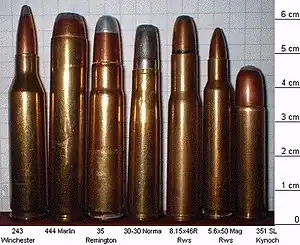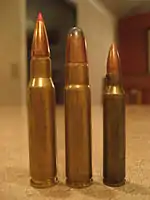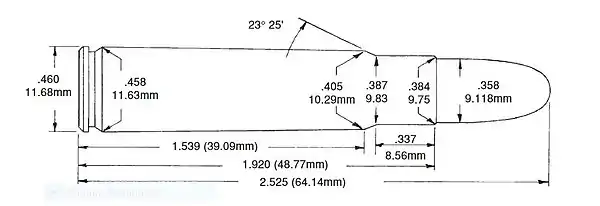.35 Remington
The .35 Remington (9.1 x 49 mm) is the only cartridge from Remington's lineup of medium-power rimless cartridges still in commercial production. Introduced in 1906, it was originally chambered for the Remington Model 8 semi-automatic rifle in 1908.[3]
| .35 Remington | ||||||||||||||||||||
|---|---|---|---|---|---|---|---|---|---|---|---|---|---|---|---|---|---|---|---|---|
 | ||||||||||||||||||||
| Type | Rifle | |||||||||||||||||||
| Place of origin | United States | |||||||||||||||||||
| Production history | ||||||||||||||||||||
| Designer | Remington | |||||||||||||||||||
| Designed | 1906 | |||||||||||||||||||
| Manufacturer | Remington | |||||||||||||||||||
| Produced | 1906–present | |||||||||||||||||||
| Specifications | ||||||||||||||||||||
| Case type | Rimless, bottleneck | |||||||||||||||||||
| Bullet diameter | .358 in (9.1 mm) | |||||||||||||||||||
| Neck diameter | .384 in (9.8 mm) | |||||||||||||||||||
| Shoulder diameter | .405 in (10.3 mm) | |||||||||||||||||||
| Base diameter | .458 in (11.6 mm) | |||||||||||||||||||
| Rim diameter | .460 in (11.7 mm) | |||||||||||||||||||
| Case length | 1.920 in (48.8 mm) | |||||||||||||||||||
| Overall length | 2.525 in (64.1 mm) | |||||||||||||||||||
| Primer type | Large rifle | |||||||||||||||||||
| Maximum pressure (CIP) | 39,900 psi (275 MPa) | |||||||||||||||||||
| Maximum pressure (SAAMI) | 33,500 psi (231 MPa) | |||||||||||||||||||
| Maximum CUP | 33,500 CUP | |||||||||||||||||||
| Ballistic performance | ||||||||||||||||||||
| ||||||||||||||||||||
| Test barrel length: 24 Source(s): Accurate Powder [2] | ||||||||||||||||||||
It is also known as 9 x 49 mm Browning and 9 mm Don Gonzalo.
History
Over the years, the .35 Remington has been chambered in a variety of rifles by most firearms manufacturers, and continues in popularity today in the Marlin Model 336 lever-action and Henry Side Gate Lever Action. It is also a popular cartridge for single-shot hunting pistols like the Thompson/Center Contender and the Remington XP-100. For hunters looking for a medium-power rifle with moderate recoil, for short to medium ranges, the .35 Remington is popular alongside the .30-30 Winchester.[4] It has a small but loyal following in the northeast and areas of the southern United States.[4]
The cartridge uses a medium to heavy bullet and has moderate recoil based on a moderate pressure level of 33,500 CUP as set by SAAMI.[2] The normal factory load consists of a 200 grain round-nosed bullet with a muzzle velocity of 2080 feet per second. This 200 grain bullet is nearly 18% heavier than the .30-30's 170 grain bullet, and has a 16% larger frontal area. This gives it a substantial increase in power over the .30-30, especially when used on larger game species.
Remington helped promote the advantage in power that the .35 Remington had over the .30-30 through a series of advertising campaigns in the early 1900s. One of their advertisements even publicized the ability of the .35 Remington to penetrate a 5/16″ steel plate, which the .30-30 Winchester could not do.[4]
The .35 Remington is considered a fine round for deer, elk, black bear, and other medium and large game as long as ranges are reasonable.[5] Hornady currently produces a .35 Remington load in their LEVERevolution line that features a rubber-tipped spitzer bullet which is safe to use in lever-action or pump-action firearms with tubular magazines.
 (Left to right) .308 Winchester, .35 Remington Soft Point, and .223 Remington
(Left to right) .308 Winchester, .35 Remington Soft Point, and .223 Remington
Dimensions

See also
References
- "35 Rem 200 gr FTX LEVERevolution". Hornady Manufacturing Company. Archived from the original on 2022-03-28. Retrieved 17 November 2021.
- ".35 Remington Accurate Online Reloading Data" (PDF). Archived from the original (PDF) on 2010-06-02. Retrieved 2007-08-13.
- Fryxell, Glen. "The .35 Remington: America's Other Levergun". Archived from the original on 2021-10-25.
- McAdams, John (2014-07-28). ".35 Remington: Ultimate Guide To What You Need To Know". The Big Game Hunting Blog. Archived from the original on 2021-11-17. Retrieved 17 November 2021.
- Hawks, Chuck. "The .35 Remington". Archived from the original on 2021-04-18.